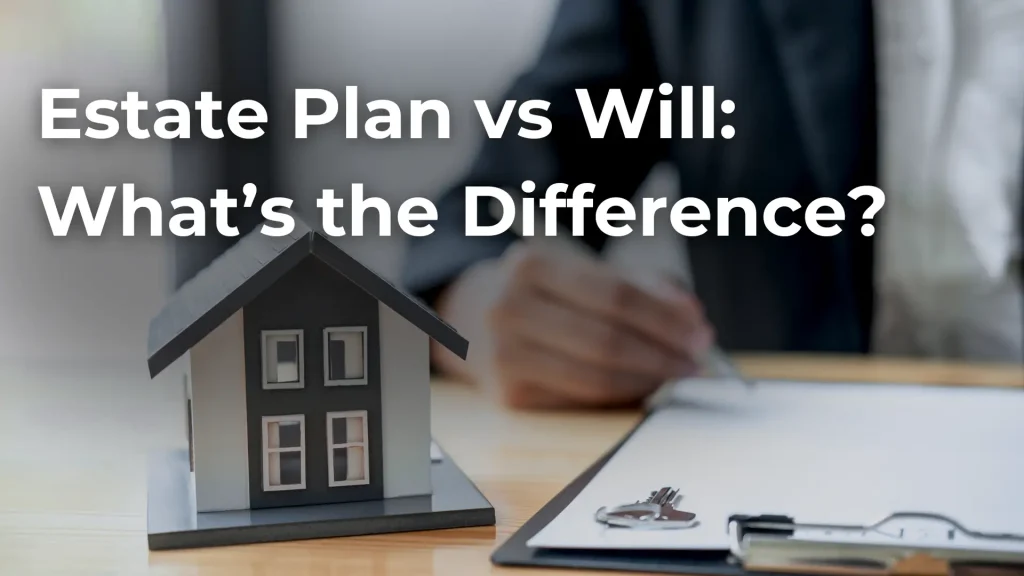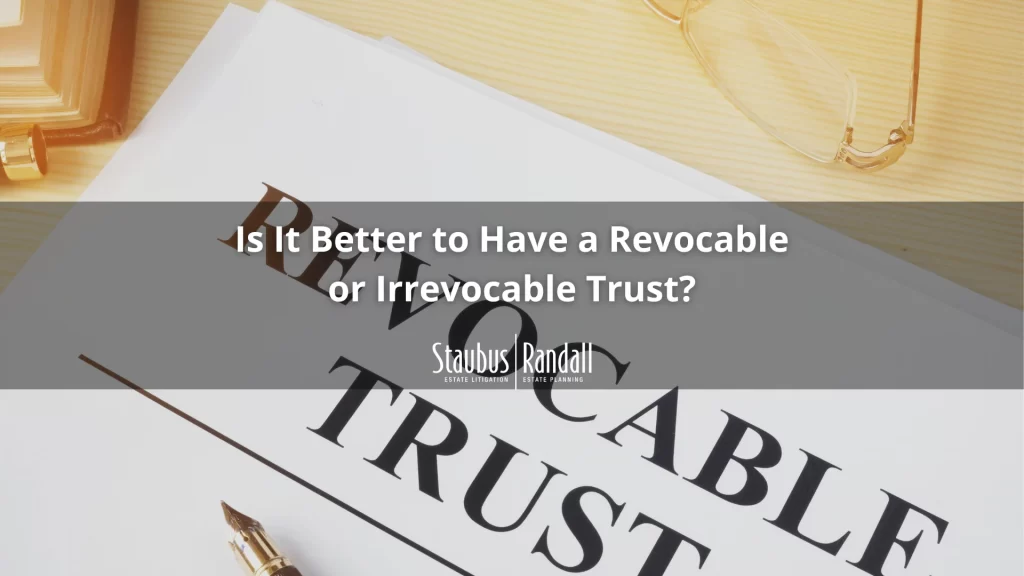
Understanding the difference between an estate plan vs. a will is crucial when planning for the future. While both tools help manage your assets and protect your loved ones, they serve different purposes and offer varying levels of control. A will outlines your final wishes. An estate plan, meanwhile, encompasses a broader strategy for managing your assets and health decisions.
Understanding Wills
A will, also known as a last will and testament, designates beneficiaries for your assets, appoints an executor to oversee the distribution of your estate, and names guardians for your minor children. It is a fundamental part of any estate plan, but you shouldn’t mistake it for an estate plan in its entirety.
If you pass away without a will (also called dying while intestate), the state of Texas determines who gets your assets. That process can be long, expensive, and stressful for your family. Plus, your assets might benefit people you didn’t want to have them. These are just some of the many reasons it’s important to establish a will while you can – there’s no time that’s “too early” to handle this step in creating your estate plan.
Estate Planning: A Comprehensive Approach
A comprehensive estate plan goes beyond a simple will, offering various tools to help manage your assets, health care, and end-of-life wishes. By including these additional components, you can ensure your wishes are honored and that your loved ones are cared for in a time of need. Below are some key elements to consider when creating a thorough estate plan:
- Trusts – Trusts allow you to manage and distribute assets to beneficiaries, often reducing estate taxes and bypassing probate. They can also provide financial support for loved ones over time.
- Health Care Power of Attorney – This document designates someone to make medical decisions on your behalf if you become incapacitated.
- Financial Power of Attorney—This tool gives a trusted person authority to handle your financial matters if you cannot do so.
- Living Will – Also known as an advance directive, this outlines your wishes for medical care and life-sustaining treatments.
- Beneficiary Designations—Ensuring your accounts, such as life insurance or retirement plans, have named beneficiaries helps avoid probate and ensures quick access for loved ones.
Who Can Benefit from Having an Estate Plan?
Anyone with assets, loved ones, or specific end-of-life wishes can benefit from having an estate plan. Estate plans are not just for the wealthy – they help people at all income levels protect their families and ensure their final wishes are honored. Individuals with children can designate guardians and set up financial support through trusts. Those with health care concerns can use advance directives and powers of attorney to guarantee their medical preferences are followed. Estate plans also prevent disputes by clearly outlining how you want your assets to be distributed, saving time, money, and stress for surviving family members. Whether single, married, younger, or older, having a well-organized estate plan provides peace of mind and protects the people and things that matter most.
Average Cost for Will and Estate Planning
The cost of creating an estate plan varies depending on its complexity and the professional services involved. Factors such as the need for trusts, powers of attorney, and other specialized documents can influence the overall cost. Consulting with a Dallas estate planning attorney ensures a well-crafted plan that meets your needs.
Estate Planning and Wills Checklist

When considering estate planning and wills, following a checklist is helpful to ensure you cover all necessary aspects. Here are some key points to include:
- Inventory your assets, including property, investments, bank accounts, and personal belongings
- Determine your beneficiaries and decide how you want your assets distributed
- Choose an executor for your will and trustees for any trusts
- Appoint guardians for minor children if applicable
- Draft a durable power of attorney for financial matters
- Create a health care power of attorney and a living will
- Update beneficiary designations on life insurance, retirement accounts, and other assets
- Review and update your estate plan regularly to reflect changes in your circumstances or wishes
Contact an Estate Planning Lawyer in Dallas
Working with a qualified Dallas estate planning attorney who understands Texas laws and can create a plan for your specific needs is one of the most effective steps you can take when initiating the estate planning process. The attorneys at Staubus, Blankenship, Legere and Walker PLLC bring significant experience in estate planning and probate concerns to our work with clients like you. We’re here to help you create a clear estate plan that protects your assets, fulfills your goals, and ensures your wishes are honored. Contact us today at (214) 833-0100 for a consultation.
Related Posts:
What Is Estate Planning Law? Definition & Key Components
Essential Estate Planning Documents Checklist
Texas Specific Estate Planning Laws
Using Survivorship Life Insurance in Estate Planning
Pros and Cons of Having a Will
How Long Do You Have to Contest a Will in Texas?
What Evidence Do You Need to Contest a Will in Texas?
Common Reasons for Estate Litigation

After you pass,
estate planning is critical to caring for your family and ensuring they honor your wishes. However, many hesitate to start the process because they wonder, “How much does estate planning cost?” While these concerns are understandable, there are many reasons why the value of having an experienced
legal team craft your estate plan far outweighs the expense.
Why You Need an Estate Plan
Before wading into the potential costs of hiring a lawyer to create and manage your estate plan, it’s crucial to understand why you need an estate plan. First and foremost, an estate plan is essential for everyone, regardless of age or wealth. It helps ensure that your family fulfills your wishes after you pass and receive the items and assets you wish them to have. Without an estate plan, state laws will decide how your assets are distributed, which might not align with your preferences.
An estate plan can also help your family avoid disputes once you’re gone. Outlining who gets what can prevent misunderstandings and conflicts among your heirs. It also makes closing your estate smoother and less stressful for your family during a difficult time.
Additionally, an estate plan can save your loved ones time and money by reducing the costs and delays associated with probate—the process of distributing your estate. It can also help minimize estate taxes, ensuring more assets go to your beneficiaries. By planning ahead, you take control of your legacy and provide peace of mind for yourself and your family.
DIY Estate Planning vs. Hiring an Attorney
A DIY approach to estate planning might seem like a good way to save money upfront. However, it can lead to costly mistakes and complications down the line. Without professional guidance, you might miss important details or fail to consider all your options.
Hiring an attorney is crucial to crafting a thorough and legally enforceable estate plan. An experienced lawyer can help you address complex legal issues, avoid errors, and tailor your plan to your situation. In the long run, this can save you and your loved ones time, money, and hassle and provide peace of mind.
What Lawyers Charge for Estate Planning Services
Regarding estate planning, each lawyer has their own way of charging for their services. Generally, estate planning attorneys use two fee structures: charging by the hour or a flat rate.
In the former arrangement, lawyers bill you for the time they spend working on your case. This can include meetings, drafting documents, and answering questions. The hourly rate can vary depending on the lawyer’s experience and location.
On the other hand, some lawyers charge a flat rate for specific and relatively straightforward estate planning services, such as drafting a will. This means you’ll pay a set fee for the entire service, regardless of how much time the lawyer spends. This can be beneficial for clients who prefer knowing the total cost upfront. Both fee structures have advantages, and the right choice depends on your personal preferences and the complexity of your estate planning needs.
Factors That Affect the Cost of Estate Planning Services

How much you can expect to pay for estate planning services will depend on several factors, including the following:
- The Complexity of Your Estate: The more assets you have and the more complicated your financial situation, the more time and effort your attorney will need to create a comprehensive estate plan. This can increase the cost of legal services.
- The Type of Documents Needed: Basic documents like simple will typically cost less than more complex documents like trusts or advanced directives.
- Your Attorney’s Experience: More experienced attorneys might charge higher fees due to their advanced knowledge and reputation within the field.
- Your Geographic Location: The cost of legal services can vary depending on where you live. Estate planning services in larger cities or high-cost areas may be more expensive than those in smaller towns.
- Any Specialized Needs: Addressing complicated arrangements, such as planning for a family member with special needs or anticipating complex tax situations, can increase the cost of legal services due to the specific knowledge and additional work involved.
Contact a Dallas Estate Planning Lawyer Today
At Staubus, Blankenship, Legere and Walker PLLC, our Dallas estate planning attorneys want to take the mystery out of the estate planning process. We provide a range of services to fit different needs and budgets. Whether you need basic documents like a will or more complex planning like a trust, we can deliver robust legal guidance at a competitive price. Contact Staubus, Blankenship, Legere and Walker PLLC today at (214) 833-0100 for a consultation, and let’s discuss your estate in detail.
Related Posts:
What Is Estate Planning Law? Definition & Key Components
Using Survivorship Life Insurance in Estate Planning
What You Need to Know About Estate Planning for a Loved One with Alzheimer’s
Top Tips for Creating an Estate Plan for Special Needs Adults
Common Estate Planning Myths Debunked

The estate planning process enables individuals to manage and distribute their assets in a way that reflects their wishes, meets their goals, and protects their loved ones. One of the tools available for estate planning is trusts, which offer several benefits to those who want the peace of mind that comes with knowing their estates will be managed and distributed according to their desires. A Dallas trust and estate planning attorney can help you identify the type of trust that best suits your needs and goals.
What Is a Trust?
A trust is a legal arrangement in which the person who establishes the trust (the grantor) transfers assets to the trustee, who manages these assets on behalf of the trust’s beneficiaries. Trusts can be either revocable or irrevocable. A revocable trust, also known as a living trust, can be changed or terminated by the grantor during their lifetime. Modifying or revoking an irrevocable trust once established is far more difficult.
Types of Estate Planning Trusts
Lawyers can employ several different estate planning tools on behalf of their clients. Each serves distinct purposes and meets specific needs:
- Revocable Living Trusts— This type of trust allows the grantor to control their assets and make necessary changes. It helps avoid probate and provides a seamless transition of assets upon the grantor’s death.
- Irrevocable Trusts – These trusts are difficult to modify or terminate once established. They offer greater asset protection and can help reduce estate taxes, as the assets are not part of the grantor’s taxable estate.
- Testamentary Trusts – Created through a will, these trusts take effect upon the grantor’s death. They are often used to manage assets for minor children or other beneficiaries who may not be capable of handling large sums of money.
- Special Needs Trusts— A special needs trust provides for individuals with disabilities without affecting their eligibility for public benefits. It ensures beneficiaries receive the support they need while preserving access to essential government programs.
- Charitable Trusts – Established to support charitable causes, these trusts offer tax benefits to the grantor while ensuring that their philanthropic goals are met. Charitable remainder trusts and charitable lead trusts are two common types.
Trusts for Different Life Stages and Needs
Many individuals have unique circumstances that influence their estate planning needs. Trusts can be structured to meet the needs of beneficiaries at various life stages. Trusts ensure financial security for minor children by managing assets until they reach a specific age. Special needs trusts provide for individuals with disabilities while enabling them to access government benefits, enhancing their quality of life.
In elder care planning, trusts manage assets if the grantor becomes incapacitated, thus providing for their needs. For legacy planning, charitable trusts allow individuals to support causes that mean the most to them while receiving tax benefits.
Benefits of Trust and Estate Planning Services

If you’re looking for a way to manage your estate, a knowledgeable Texas estate planning lawyer can help you select the trust options that will most efficiently and effectively provide the benefits you need. Some of how a trust can enhance your overall estate plan include:
- Avoiding Probate – Trusts help bypass probate, ensuring a more efficient and private distribution of assets. Probate can be time-consuming and expensive, making trusts an attractive alternative.
- Privacy – Unlike wills, the contents of which become a matter of public record, trusts keep estate matters private. This can be particularly important for individuals who value confidentiality.
- Flexibility and Control – Grantors can specify detailed instructions regarding the distribution of assets to beneficiaries. This level of control ensures that trustees manage assets according to the grantor’s wishes.
- Protecting Assets – Trusts can safeguard assets from creditors and legal challenges, providing peace of mind. This protection is especially valuable for beneficiaries facing financial or legal difficulties.
- Reducing Estate Taxes—Certain trusts can help minimize estate tax liabilities, preserving more wealth for beneficiaries. Irrevocable life insurance trusts (ILITs) and grantor-retained annuity trusts (GRATs) are examples of trusts that offer tax advantages.
Contact a Dallas Estate Planning Attorney to Protect Your Legacy
Trusts are vital to estate planning, providing significant flexibility, control, potential tax benefits, and peace of mind. Whether you want to establish a new trust or review an existing one, the Dallas trust and estate planning attorneys at Staubus, Blankenship, Legere and Walker PLLC are ready to help. Don’t leave your legacy to chance. Contact us online or call (214) 833-0100 to schedule a consultation. We’ll work with you to create a customized trust and estate plan that protects your assets and provides for your loved ones according to your wishes.
Related Posts:

Estate planning law forms a crucial part of legal practice, focusing on preparing for managing and transferring an individual’s assets in the event of incapacity or death. At Staubus, Blankenship, Legere and Walker PLLC, we understand the importance of proper estate planning and its impact on your family’s future. This blog post will explore the definition of estate planning law and its key components to help you better understand this essential legal field.
What Is Estate Planning Law?
Estate planning law encompasses the legal strategies and documents used to manage an individual’s assets during their lifetime and distribute them after death. It involves creating a comprehensive plan to ensure your wishes are carried out, your loved ones are cared for, and your assets are protected from unnecessary taxes and legal complications.
Critical Components of Estate Planning
Some key components of estate planning include:
Wills
A will serves as the foundation of most estate plans. This legal document outlines how you want your assets to be distributed after your death. Additionally, it allows you to name a guardian for minor children and specify your final wishes. Without a valid will, state laws determine how your assets will be distributed, which may not align with your intentions.
Trusts
Trusts offer a flexible way to manage and distribute assets. They can help you avoid probate, reduce estate taxes, and provide for beneficiaries with special needs. Revocable living trusts are particularly popular as they allow you to maintain control of your assets during your lifetime while ensuring an effortless transfer after your death.
Powers of Attorney
Powers of attorney are vital estate planning documents. They designate someone to make decisions on your behalf if you become incapacitated. There are two main types:
- Financial Power of Attorney: Allows your chosen agent to manage your finances and property.
- Healthcare Power of Attorney: Empowers someone to make medical decisions for you if you cannot do so.
Advance Healthcare Directives
Also known as living wills, these documents specify your wishes for end-of-life care. They guide your healthcare providers and family members about your preferences regarding medical treatment in various scenarios.
Beneficiary Designations
Many assets, such as life insurance policies and retirement plans, pass to beneficiaries outside the will or trust. Regularly reviewing and updating these beneficiary designations is important to ensure your assets are distributed according to your wishes.
Business Succession Planning
Business owners must incorporate business succession planning into their estate plans. This involves determining how the business will be managed or transferred in the event of their retirement, incapacity, or death.
Tax Planning Strategies
Estate planning law also involves strategies to minimize estate taxes and other tax liabilities. These may include gifting strategies, charitable donations, and using certain trusts.
Avoiding Probate
One of the primary goals of estate planning is to avoid the probate process whenever possible. Probate can be time-consuming, expensive, and public. Strategies to avoid probate include:
- Creating revocable living trusts
- Using joint ownership with the right of survivorship
- Designating beneficiaries on accounts and policies
- Making lifetime gifts
The Importance of Regular Updates
Estate planning is not a one-time event. Life changes such as marriages, divorces, births, deaths, and significant financial changes can impact your estate plan. Regularly reviewing and updating your estate plan ensures it aligns with your current wishes and circumstances.
How Staubus, Blankenship, Legere and Walker PLLC Can Help
 At Staubus, Blankenship, Legere and Walker PLLC, our experienced Texas estate planning attorneys can guide you through the complex process of creating a comprehensive estate plan. We take the time to understand your unique situation, goals, and concerns to develop a tailored strategy that protects your assets and provides for your loved ones.
At Staubus, Blankenship, Legere and Walker PLLC, our experienced Texas estate planning attorneys can guide you through the complex process of creating a comprehensive estate plan. We take the time to understand your unique situation, goals, and concerns to develop a tailored strategy that protects your assets and provides for your loved ones.
Our services include:
- Drafting and reviewing wills and trusts
- Creating powers of attorney and advance healthcare directives
- Developing tax-efficient estate plans
- Assisting with business succession planning
- Helping you avoid probate when possible
- Regularly reviewing and updating your estate plan
Don’t leave your family’s future to chance. Contact Staubus, Blankenship, Legere and Walker PLLC today at (214) 833-0100 to schedule a consultation with one of our experienced Dallas estate planning attorneys. We’ll help you create a comprehensive estate plan that gives you peace of mind and protects your legacy for generations.
Remember, proper estate planning is one of the most thoughtful gifts you can give the people you love. It provides clarity, reduces family conflicts, and ensures your hard-earned assets are distributed according to your wishes. Help secure your family’s future by working with the experienced team at Staubus, Blankenship, Legere and Walker PLLC.
Related Posts:
Using Survivorship Life Insurance in Estate Planning
Common Misconceptions About Probate
Will or Trust: How to Choose Which Is Right for You
Will Contests On The Rise
What You Need to Know About Estate Planning for a Loved One with Alzheimer’s

Estate planning involves creating legal documents outlining your healthcare, financial affairs, and property management preferences. These documents are crucial as they guide your family in making decisions on your behalf should you become unable to do so. They also clarify your intentions for distributing your assets and property after passing away.
Even though you can verbally tell your family what you want, estate planning documents have legal weight and can be enforced in court. If you’re wondering what documents are needed for estate planning, you’ve come to the right place.
Last Will and Testament
In Texas, a last will and testament, or “will.” serves as your roadmap for distributing your assets after you pass away. It lets you decide who inherits your property, who manages your estate, and who looks after any minor children you have.
If you need to change your will, you can add a codicil. You must follow the same strict rules you used to make the original will. This way, you can update your wishes as your life evolves without starting from scratch.
Dying without a will means you leave the distribution of your assets up to Texas intestate laws. What does that mean for you? If you pass away “intestate,” the state steps in and divides your investments based on a preset formula, which might not reflect your wishes and can especially complicate things for non-traditional families or unmarried partners.
Draft a will that clearly describes your desires to ensure your assets go exactly where you want them. This step keeps you in control rather than leaving critical decisions to impersonal state laws.
Having a will in place prevents stress for grieving people by eliminating complications that can arise without an estate plan.
Durable Power of Attorney
In Texas, a general power of attorney grants someone the authority to handle your affairs, such as financial transactions or property management. However, this power typically ceases if you become incapacitated.
In contrast, a durable power of attorney (DPOA) remains effective even if you face medical or other conditions that lead to mental incapacity. This feature makes a DPOA an essential tool in estate planning, ensuring that your chosen agent can continue managing your affairs without interruption, regardless of your health status.
Under a DPOA, you can grant your agent a wide range of powers, including:
- Managing your financial assets
- Making investment decisions
- Handling real estate transactions
- Dealing with government agencies, like the IRS
This broad authority helps ensure that someone you trust is always in charge and ready to act in your best interests.
Texas recognizes two types of durable powers of attorney: immediate and springing. An immediate DPOA takes effect when you sign it, giving your agent the authority immediately. On the other hand, a springing DPOA only activates under circumstances you specify, such as a medical doctor declaring you incapacitated.
By choosing the right type of DPOA for your needs, you can achieve continuity in managing your affairs, providing peace of mind for you and your family.
Medical Power of Attorney

In Texas, a Medical Power of Attorney (MPOA) is a legal document allowing you to appoint someone to make healthcare decisions on your behalf if you cannot do so. This vital estate planning tool ensures that your healthcare preferences are honored, even when you can’t voice them yourself.
With an MPOA, you grant your designated agent the authority to make various medical decisions. These can range from choosing medical treatments and accessing your medical records to deciding on your admission to or discharge from a healthcare facility. Importantly, this agent can also make decisions about palliative care and end-of-life treatment, aligning any medical intervention with your personal values and preferences.
Having an MPOA in Texas is crucial as it places control in the hands of someone you trust, helps prevent family conflicts, and aligns decisions regarding your health with your wishes.
Get Your Estate Planning Started Today
The estate planning documents checklist here covers only the basics. To ensure your plan is comprehensive and tailored to your needs, avoid relying on online documents. Instead, consult a Dallas estate planning lawyer at Staubus, Blankenship, Legere and Walker PLLC, which boasts over a century of combined experience drafting and defending estate planning documents in Dallas and throughout Texas. Contact Staubus, Blankenship, Legere and Walker PLLC online or by calling (214) 833-0100 to experience big-firm benefits in a boutique atmosphere and get personalized, professional attention to every detail of your estate plan.
Related Posts:
Using Survivorship Life Insurance in Estate Planning
Texas Specific Estate Planning Laws
What Are the Most Important Things to Put in a Will?
How to Figure out How to Divide My Estate Amongst My Heirs
Will or Trust: How to Choose Which Is Right for You
How Long Do You Have to Transfer Property After Death

Are you planning your estate in the Lone Star State? If so, familiarizing yourself with Texas estate planning laws can help you determine what actions you may need to take to pass down your legacy according to your wishes.
A Texas estate planning attorney familiar with Texas law is a critical guide through this complicated process. They can advise you on the current rules and align your plan to meet any changes to estate tax laws. In the meantime, this overview covers some of the essential elements of Texas estate planning.
Powers of Attorney in Texas
A “power of attorney” (PoA) is a document drafted by one party (the principal) that grants another party (the agent) the right to make certain decisions on the principal’s behalf. These powers vary from document to document but could include:
- Making business decisions
- Managing financial affairs
- Making medical decisions
There are two main types of PoA:
- General Powers of Attorney, which allow the agent to take any legal action the principal could
- Limited Powers of Attorney, which allows the agent to make only specific decisions on the principal’s behalf, and often with an expiration date
Some powers of attorney will sunset if the principal becomes incapacitated. Chapter 752 of the Estates Code allows for the establishment of durable power of attorney. Unlike other powers of attorney, a durable PoA will either go into or remain in effect when the principal suffers the effects of injury, illness, or age. You might establish this type of PoA so that someone can make important decisions on your behalf when you can no longer.
You can choose what types of powers to grant when establishing a PoA. For example, you may want to establish a medical power of attorney so someone can make health care decisions on your behalf while not granting them the right to make financial decisions.
Intestacy in Texas
If you die without a will in the State of Texas, intestacy law will determine who inherits your estate. Here’s how that works under a variety of scenarios:
- Your spouse automatically inherits your estate if you’re married.
- If you don’t have a spouse, your children and their descendants will automatically inherit your estate.
- Your estate passes to your father and mother if you have no spouse, children, or descendants. If you only have one surviving parent, that parent and your siblings (and their descendants) will inherit the estate. Your one surviving parent will receive the entirety of your estate if you have no siblings.
- If you have no spouse, children, descendants, or surviving parents, your estate will pass to your siblings and their descendants.
The law further defines how assets will be distributed if none of the parties described live. Creating a will or trust lets you exercise more control instead of letting the state decide what happens to your assets.
Wills and Trusts in Texas
 Creating a will allows you to exercise some control over the distribution of assets after your passing. However, with a will, your beneficiaries must go through the probate process before collecting what you’ve left to them. A probate court will also have to be involved, meaning information about the distribution of your assets will be public record.
Creating a will allows you to exercise some control over the distribution of assets after your passing. However, with a will, your beneficiaries must go through the probate process before collecting what you’ve left to them. A probate court will also have to be involved, meaning information about the distribution of your assets will be public record.
You may help your beneficiaries avoid probate by establishing a trust. Like other states, Texas allows you to set aside assets in a trust that a trustee controls on behalf of the beneficiaries named in the trust. With a revocable living trust, you can still maintain control of the assets in the trust during your lifetime. With an irrevocable living trust, you separate the assets from your estate.
A trust can let beneficiaries receive their inheritances more quickly. Setting aside assets in a trust may also shelter those assets from estate taxes.
In addition, there are many types of specialized trusts you could establish. For example, you may create a spendthrift trust if you want to leave an inheritance to someone who might be irresponsible with money. This type of trust allows another party to control the trust’s assets.
Discuss your options with a professional. Speaking with an estate planning legal pro can give you peace of mind when making future plans.
Contact a Dallas, TX, Estate Planning Lawyer
Working with a Dallas estate planning attorney is the first step to developing a rock-solid estate plan. At Staubus, Blankenship, Legere and Walker PLLC, our Texas estate planning laws knowledge can help you better understand your options and select the right choices for your goal. Learn more about what we can do for you by contacting us online or at (214) 833-0100 today.
Related Posts:
Using Survivorship Life Insurance in Estate Planning
Common Estate Planning Myths Debunked
Will or Trust: How to Choose Which Is Right for You
Is It Better to Have a Revocable or Irrevocable Trust?
How to Approach Power of Attorney Abuse

Estate planning in Texas involves making decisions about issues like what type of life insurance policy to buy. An option you might consider if you’re married or in a similar formal relationship is a survivorship life insurance policy. How are survivorship life insurance policies helpful in estate planning? Although these policies aren’t for everyone, they can play valuable roles in estate planning.
What Is Survivorship Life Insurance in Dallas, TX?
Survivorship life insurance is a type of insurance you might consider if you wish to cover yourself and a spouse or partner under the same life insurance policy. Individual life insurance covers one person and pays out death benefits when they die.
A survivorship life insurance policy is different. When one spouse or partner covered by a policy dies, the policy doesn’t pay out until the surviving spouse or surviving partner under the policy also passes. In other words, a survivorship life insurance policy’s death benefit doesn’t pay out until both policyholders pass.
How Are Survivorship Life Insurance Policies Helpful in Estate Planning?
A survivorship life insurance policy offers many potential benefits to a married couple in Texas. This type of policy can be used by people in a civil union, partners who live together, or business partners. The cost of a survivorship life insurance policy may be less than that of two policies for two partners, although this isn’t always the case.
A survivorship life insurance policy can also be helpful for estate planning purposes. Consider the following examples:
Helping cover estate tax costs
The unlimited marital deduction prevents an estate tax from being levied on a married person’s estate after they pass before their spouse. When one spouse dies, as long as their spouse is the sole beneficiary, the surviving spouse can receive the entirety of their estate without paying taxes. When the second spouse dies, an estate tax may apply if the total of the estate they pass to their beneficiaries meets or exceeds the estate tax exemption amount. The death benefit from a survivorship life insurance policy could potentially help cover estate taxes and administrative costs in this scenario.
Reducing the tax burden
A survivorship life insurance policy’s death benefit may be greater than an individual policy’s benefit. Because a life insurance policy’s death benefit isn’t taxable in Texas unless the beneficiary is an estate or other non-person, this option may offer a tax-efficient way to leave more money to beneficiaries.
Planning to enjoy retirement
Some assume a survivorship life insurance policy is only helpful for couples with large net worths. This isn’t necessarily the case. If retirees wish to spend their savings enjoying themselves during retirement but don’t want to worry about leaving behind nothing for their heirs, a survivorship life insurance policy could offer some peace of mind.
Providing for a dependent with special needs
A survivorship life insurance policy can also be helpful when a couple has a child or other dependent with special needs. The payout from the policy could help provide for the needs of a dependent either directly or through a special needs trust.
Funding a business
A survivorship policy is also an option to consider if you own a business and wish to ensure its survival after your passing. The death benefit from a survivorship life insurance policy could go directly to your business partners, helping them keep the company running during a critical transition phase. Alternatively, you could leave the death benefit to your children, providing the funds they may need to take over the organization smoothly.
The specific way you use this type of policy in estate planning will depend on the specifics of your situation. Upon further review, you may decide this type of policy isn’t right for you.
Potential Drawbacks of a Survivorship Life Insurance Policy in Texas
 You should know the potential disadvantages of a survivorship life insurance policy. For example, you must consider that a policy won’t pay a death benefit until you and your spouse or partner pass. That might not be ideal if you want your beneficiaries to receive the money sooner.
You should know the potential disadvantages of a survivorship life insurance policy. For example, you must consider that a policy won’t pay a death benefit until you and your spouse or partner pass. That might not be ideal if you want your beneficiaries to receive the money sooner.
You may also consider the possibility that you’ll get a divorce. If you do, splitting a survivorship life insurance policy could be complicated. These are essential factors to account for when reviewing your options.
Contact an Estate Planning Lawyer in Dallas, TX
You don’t need to determine whether a survivorship policy is right for you on your own. A Dallas estate planning lawyer from Staubus, Blankenship, Legere and Walker PLLC can help you sort your options. We’ll work closely with you to develop a plan that’s right for your goals. Get started today by contacting us online or at (214) 833-0100.
Related Posts:
Estate Planning for Blended Families
Common Estate Planning Myths Debunked
The Impact of the American Taxpayer Relief Act of 2012 (ATRA) on Estate Planning
What You Need to Know About Estate Planning for a Loved One with Alzheimer’s

Having a trust as part of your estate plan can effectively protect your assets and ensure that your wishes are carried out after your death. However, one of the most important decisions you’ll need to make is whether you should establish a revocable or irrevocable trust. Both types of trusts have advantages and disadvantages, so it’s essential to understand their differences before deciding which you need.
What Is a Revocable Trust?
A revocable trust is an estate planning tool that allows an individual, called a grantor, to retain control over their assets while alive and decide who will receive them after they die. With a revocable trust, the grantor can change the terms of the trust at any time while they are still alive.
In a revocable trust, the grantor typically serves as the trustee so they can retain control over its assets and how they are managed. The grantor can also name a successor trustee who will manage the trust’s assets in the event of their incapacitation or death.
The grantor can also designate beneficiaries or those who will inherit the trust’s assets upon the grantor’s death. Depending on the provisions in the trust document, the beneficiaries may only have access to the trust’s assets after the grantor has passed away.
One of the key advantages of setting up a revocable trust is that it allows for flexibility. The grantor can use the assets in the trust as they wish, change the terms of the trust, and appoint new trustees and beneficiaries as needed. This type of trust also allows the grantor to avoid probate court, as the trust’s assets will not be subject to probate proceedings after the grantor passes away.
What Is an Irrevocable Trust?
In an irrevocable trust, the grantor contributes assets to the trust, and the trustee manages and distributes those assets according to the grantor’s wishes. With an irrevocable trust, the grantor gives up all control over the trust assets and any rights to revoke or modify the trust in any way. Because of this, the trust cannot be changed or terminated without the beneficiary’s consent once the grantor establishes the irrevocable trust.
Some of the advantages of an irrevocable trust are that it offers more tax advantages than a revocable trust, can protect assets from creditors, and can help a beneficiary qualify for government benefits. Since the grantor no longer owns the trust assets and is not considered the owner for tax purposes, they are exempt from probate. Because the grantor has no control over the trust assets, they are not vulnerable to creditors’ claims.
Although there are many benefits to setting up an irrevocable trust, there are also some drawbacks. For example, once established, changing the trust can be difficult or impossible. Additionally, the trust assets will be managed and distributed according to the directives in the trust document, so the grantor loses control over the trust assets. Finally, there may be significant costs associated with establishing and maintaining an irrevocable trust.
Which One Is Right for You?
 Deciding between a revocable and irrevocable trust requires taking the needs of the person creating the trust into account. A revocable trust can be changed or even terminated at any time by the grantor, whereas an irrevocable trust cannot be modified or canceled after it is created without difficulty.
Deciding between a revocable and irrevocable trust requires taking the needs of the person creating the trust into account. A revocable trust can be changed or even terminated at any time by the grantor, whereas an irrevocable trust cannot be modified or canceled after it is created without difficulty.
A revocable trust allows for the grantor to retain complete control of the assets within it and can serve estate and trust planning purposes, such as avoiding probate. Irrevocable trusts provide more asset protection since they are not accessible by creditors or others making claims against the grantor’s estate.
Irrevocable trusts are also helpful in providing long-term care options, such as financial support to a disabled beneficiary or allowing a beneficiary to access income or assets from the trust in certain circumstances. When considering which type of trust is right for you, consider your short-term and long-term goals, financial situation, and other relevant factors.
Speak with a Dallas Estate Planning Lawyer
The best way to determine whether a revocable or irrevocable trust is the right choice is to consult a qualified estate planning attorney. At Staubus, Blankenship, Legere and Walker PLLC, our experienced Dallas estate litigation lawyers understand the complexities of these trusts and can provide sound advice on which type of trust is best for your specific needs. We also offer comprehensive estate planning services to ensure that your wishes are met in the event of incapacity or death. Call us today or contact us online to schedule an appointment and learn more about how we can help protect your family’s future.
Related Post
Estate Litigation: Trust Disputes and Resolution Options

Dictating how your assets should be distributed upon your passing is extremely important if you want a say in who gets your money and how much they will receive. Estate planning becomes even more important when you have children because it can indicate who will be the children’s guardians if they are minors. Estate plans can also ensure that someone trustworthy manages the children’s money while they are minors.
When creating an estate plan, you must consider your circumstances as they are today and not base the plan on the assumption that you will not pass for years. For example, if you have a minor child, you need to consider what you want to happen if you pass away while they are still a minor because, under Texas law, they cannot control assets until they are at least 18 years old.
There are a variety of ways that money can be left to your children, including wills, trusts, or by naming them beneficiaries of retirement plans, life insurance, and 529 plans. The best ways to leave your children money are through estate planning tools, such as wills and trusts.
Wills
A will is a legal document laying out how someone’s assets will be distributed upon death. If you have minor children, you can also name one or more people as the child’s guardian if you pass away while they are still minors. Generally, while the child is a minor, their guardian will control the child’s money unless another person is named to manage the minor’s money until they reach the age of majority or an agreement set out in the will, whichever is later.
For a will to be valid, you must sign it at the end of the document in the presence of two witnesses. They will also sign the document certifying that the testator voluntarily signed the document in their presence. A will has no legal effect until it is probated in the court of appropriate jurisdiction, which is usually the probate court in the county where you live at the time of your death.
Trusts
A trust takes assets out of your name and places them under a trust agreement. So, for example, if you own a house, instead of it being in your name, you will deed it to your trust. The party holding and managing the trust is known as a trustee and can be you until death. At that point, a successor trustee will become the primary trustee.
Trusts allow individuals to avoid probate because there is no property in the deceased’s name. As a result, children will have access to the money sooner than if it were left through a will. In addition, the trust can outline how the trustee should distribute the money, meaning you can direct trustees to pay your children’s expenses or cash distributions, regardless of age.
Estate planning tools like wills and trusts are the best options for leaving money to your children because you can outline how and when your children will receive the money. If the child is a minor, you can even dictate how they can spend the money. However, while wills and trust are the best options, there are other ways to leave your children money, including:
- Retirement accounts: Generally, retirement accounts like 401k’s and IRAs allow for named beneficiaries. The money will go to the decedent’s estate if there is no designated beneficiary. Naming a beneficiary will enable funds to avoid probate, saving time when it is accessible to the beneficiaries. Like the original owners of the retirement account, heirs will owe taxes on the money when they take distributions unless they were Roth IRA contributions.
- Life insurance: Life insurance is meant to make sure that people who rely on your financially will be okay upon your death. Purchasing life insurance and naming your children as beneficiaries can provide their children with financial protection upon their parent’s death. You can also name your trust as the beneficiary, allowing your trustee to have control of the life insurance money rather than giving your children direct control of the funds if they have reached the age of majority.
- 529 plans: A 529 plan is a tax-advantaged savings plan to help pay for your children’s education. 529 plans allow tax-free withdrawals for qualifying education expenses, which include expenses directly related to education expenses from kindergarten through postsecondary. Although, withdrawals for expenses for grades K-12 are limited.
Will My Children Receive My Money If I Don’t Create an Estate Plan?
 In cases where an estate plan is not created before someone’s death, their assets will be distributed according to Texas’s intestate succession laws. As a result, if you have not made an estate plan, your assets that do not have named beneficiaries will be distributed depending on who survives the decedent by at least 120 hours:
In cases where an estate plan is not created before someone’s death, their assets will be distributed according to Texas’s intestate succession laws. As a result, if you have not made an estate plan, your assets that do not have named beneficiaries will be distributed depending on who survives the decedent by at least 120 hours:
- If there is no surviving spouse, then the children will inherit everything.
- Suppose there is a surviving spouse, and the children are biologically their child. In that case, the spouse will get all of the community property, one-third of your separate property, and a lifetime right to use your real estate. The children will receive the remaining assets.
- Suppose there is a surviving spouse, but the children are not biologically related to the surviving spouse. In that case, the surviving spouse will receive one-half of the community property, one-third of your separate property, and a lifetime right to use your real estate. The children receive the remaining assets.
In Texas, community property generally means any property acquired by a couple during a marriage, with a few exceptions that an experienced attorney of Staubus, Blankenship, Legere and Walker PLLC can explain.
Contact An Experienced Estate Planning Attorney Today
If you have children, it is essential to make an estate plan because you never know what will happen. The experienced Dallas estate litigation attorneys at Staubus, Blankenship, Legere and Walker PLLC will be able to review and evaluate your specific needs and help you create an estate plan that will help ensure your assets go to those you wish them to.
Whether you are creating a new estate plan or need your current estate plan revised, the skilled attorneys of Staubus, Blankenship, Legere and Walker PLLC are ready to help. Contact us online or call us at (214) 833-0100 for a consultation.

Blended families are becoming increasingly common, with many households now consisting of remarried parents, children from multiple marriages, and adopted children. Estate planning for blended families can be a complex process, but with the help of an estate planning attorney, it’s possible to create a plan that ensures your assets are passed on to your loved ones as you intended.
What is Estate Planning for Blended Families?
Estate planning for blended families involves creating a plan, including a will, for the distribution of your assets upon your death. It includes decisions about how to divide your property and financial assets and who will take care of your children if you are no longer able to.
Estate planning also includes decisions about who will manage your finances and make healthcare decisions if you are unable to do so yourself. You can record your wishes for these matters in a living will.
Why Estate Planning is Critical for Blended Families
Some of the benefits of getting an estate plan in place include:
- Protecting children from previous relationships
- Ensuring that your assets are distributed as you intend, to whom you intend
- Avoiding disputes and family conflicts
- Making sure that your wishes are followed if you become incapacitated
- Providing financial stability for your family
The Benefits of Working with an Estate Planning Attorney
An estate planning attorney specializes in helping families create and implement estate plans. They have the experience needed to help you navigate the complex legal and financial issues that come with estate planning for blended families. Here are some of the key benefits of working with an estate planning attorney:
- Customized Solutions – Estate planning attorneys can help you create a plan tailored to your unique needs and circumstances. They will work with you to understand your goals and concerns and help you create a plan that reflects your wishes.
- Sound Advice – Estate planning attorneys have a deep understanding of the legal and financial aspects of estate planning. They can provide sound advice on how to best protect your assets and ensure that your wishes are followed. They can also advise you on estate tax law, an important component of the estate planning process.
- Avoiding Probate – Estate planning attorneys can help you create a plan that minimizes the need for probate court. Probate can be a long and costly process, and avoiding it can save your family time and money.
- Peace of Mind – Estate planning can be complex and emotional. When you work with an estate planning attorney, they can provide you with peace of mind knowing that your plan is in good hands and that your family will be protected.
Steps to Estate Planning for Blended Families
 Here are the key steps to estate planning for blended families:
Here are the key steps to estate planning for blended families:
- Gather Information – The first step in estate planning is to gather all of the relevant information about your assets and liabilities. This includes information about your property, investments, bank accounts, and other assets.
- Assess Your Goals – The next step is to assess your goals and determine what you want to accomplish with your estate plan. This may include decisions about how you want your assets to be distributed, who you want to take care of your children, and how you want your finances and healthcare managed if you are unable to do so.
- Create a Plan – Once you’ve gathered all the relevant information and assessed your goals, you can work with an estate planning attorney to create a comprehensive estate plan. This will include important documents such as a last will, power of attorney, and living will.
- Review and Update – Estate planning is an ongoing process, and it’s best to review and update your plan regularly. Your attorney can help you keep your plan up-to-date and ensure that it reflects your current wishes and circumstances.
The Estate Planning Attorneys at Staubus, Blankenship, Legere and Walker PLLC Can Help
Estate planning for blended families can be a complex process, but it’s essential to ensure that your assets are protected and passed on to your loved ones as you intended. By working with an estate litigation attorney, you have peace of mind knowing that your family is protected and that everyone will follow your wishes.
If you are a member of a blended family, you should consider starting estate planning as soon as possible. Our skilled estate planning attorneys have the experience needed to ensure that your family is looked after no matter what happens in the future. Our team is standing by to help. Give us a call today at (214) 833-0100 to schedule a consultation.







 At
At 




 You should know the potential disadvantages of a survivorship life insurance policy. For example, you must consider that a policy won’t pay a death benefit until you and your spouse or partner pass. That might not be ideal if you want your beneficiaries to receive the money sooner.
You should know the potential disadvantages of a survivorship life insurance policy. For example, you must consider that a policy won’t pay a death benefit until you and your spouse or partner pass. That might not be ideal if you want your beneficiaries to receive the money sooner.
 Deciding between a revocable and irrevocable trust requires taking the needs of the person creating the trust into account. A revocable trust can be changed or even terminated at any time by the grantor, whereas an irrevocable trust cannot be modified or canceled after it is created without difficulty.
Deciding between a revocable and irrevocable trust requires taking the needs of the person creating the trust into account. A revocable trust can be changed or even terminated at any time by the grantor, whereas an irrevocable trust cannot be modified or canceled after it is created without difficulty.
 In cases where an estate plan is not created before someone’s death, their assets will be distributed according to
In cases where an estate plan is not created before someone’s death, their assets will be distributed according to 
 Here are the key steps to estate planning for blended families:
Here are the key steps to estate planning for blended families:





